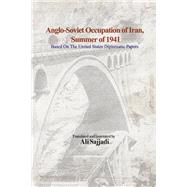Anglo-Soviet Occupation of Iran, Summer of 1941 Based on The United States Diplomatic Papers
, by Sajjadi, Ali- ISBN: 9781667876719 | 1667876716
- Cover: Paperback
- Copyright: 1/4/2023
In both Iran and the United States, it has become commonplace since the revolution in Iran for scholars and analysts to criticize the United States for actions and policies perceived to violate or threaten Iran's sovereignty, territorial integrity, and independence. In this article, Ali Sajjadi reminds us that the historical record is more complex and less categorical than the current wisdom admits. Sajjadi agrees that in the one hundred years since 1921, the Soviet Union (now Russia), Great Britain, and the United States of America have strongly influenced Iran's foreign and domestic policies and he examines the role each played in the diplomatic exchanges and maneuvers surrounding the Anglo-Soviet occupation of Iran in 1941. Sajjadi carefully examines scores of telegrams communicated among these three great powers as well as with the governments of Turkey and Iran in the last six months of 1941. His analysis shows that: the United States had no substantial economic or political interests in Iran prior to 1941, yet it exerted considerable influence to protect Iran's sovereignty and territorial integrity from the ambitions of the more aggressive—and desperate—Great Britain and Soviet Union. The US success in this effort was due in no little part to US Minister to Iran Louis Goethe Dreyfus, who was in contact with all the parties to the crisis and thus quite aware of each country's stance on the occupation. Sajjadi's analysis of yields a valuable timeline of the events before, during, and immediately after the crisis that helps to reveal the mindset and intentions of each of the major actors during this phase of the Second World War and helps us understand the origins of the increasingly close US relations with Iran in the postwar era.







